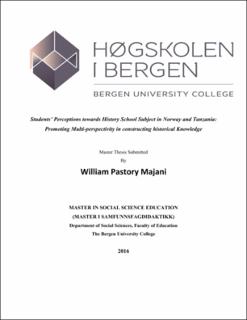| dc.contributor.author | Majani, William Pastory | |
| dc.date.accessioned | 2022-04-19T07:25:11Z | |
| dc.date.available | 2022-04-19T07:25:11Z | |
| dc.date.issued | 2016 | |
| dc.identifier.uri | https://hdl.handle.net/11250/2991213 | |
| dc.description | MASTER IN SOCIAL SCIENCE EDUCATION,
(MASTER I SAMFUNNSFAGDIDAKTIKK),
Department of Social Sciences, Faculty of Education,
The Bergen University College | en_US |
| dc.description.abstract | Student participation in the classroom is a concern attributed to many factors, with student perceptions being one of them.
This project, through a mixed method approach, has examined how the use of varied teaching methods and learning materials influence student perceptions towards history as a subject in Norwegian and Tanzanian schools, and ultimately contribute to active learners.
The study shows that the majority of the students in Tanzanian schools have negative perceptions towards history mainly because of poor teaching and issues concerning English as medium of instruction. However, Norwegian students display positive perceptions towards history due to engaging and conducive learning environments, usage of varied teaching and learning resources, and a collective understanding of the subject as relevant for their everyday life.
The study findings also show that the use of student-centred learning strategies influences both students’ perceptions and classroom participation in a positive way. | |
| dc.description.sponsorship | Student participation in the classroom is a concern attributed to many factors, with student perceptions being one of them.
This project, through a mixed method approach, has examined how the use of varied teaching methods and learning materials influence student perceptions towards history as a subject in Norwegian and Tanzanian schools, and ultimately contribute to active learners.
The study shows that the majority of the students in Tanzanian schools have negative perceptions towards history mainly because of poor teaching and issues concerning English as medium of instruction. However, Norwegian students display positive perceptions towards history due to engaging and conducive learning environments, usage of varied teaching and learning resources, and a collective understanding of the subject as relevant for their everyday life.
The study findings also show that the use of student-centred learning strategies influences both students’ perceptions and classroom participation in a positive way. | en_US |
| dc.language.iso | eng | en_US |
| dc.publisher | Høgskolen i Bergen | en_US |
| dc.rights | Navngivelse 4.0 Internasjonal | * |
| dc.rights.uri | http://creativecommons.org/licenses/by/4.0/deed.no | * |
| dc.title | Students’ Perceptions towards History School Subject in Norway and Tanzania: Promoting Multi-perspectivity in constructing historical Knowledge | en_US |
| dc.type | Master thesis | en_US |
| dc.description.localcode | MSAM613 | en_US |

